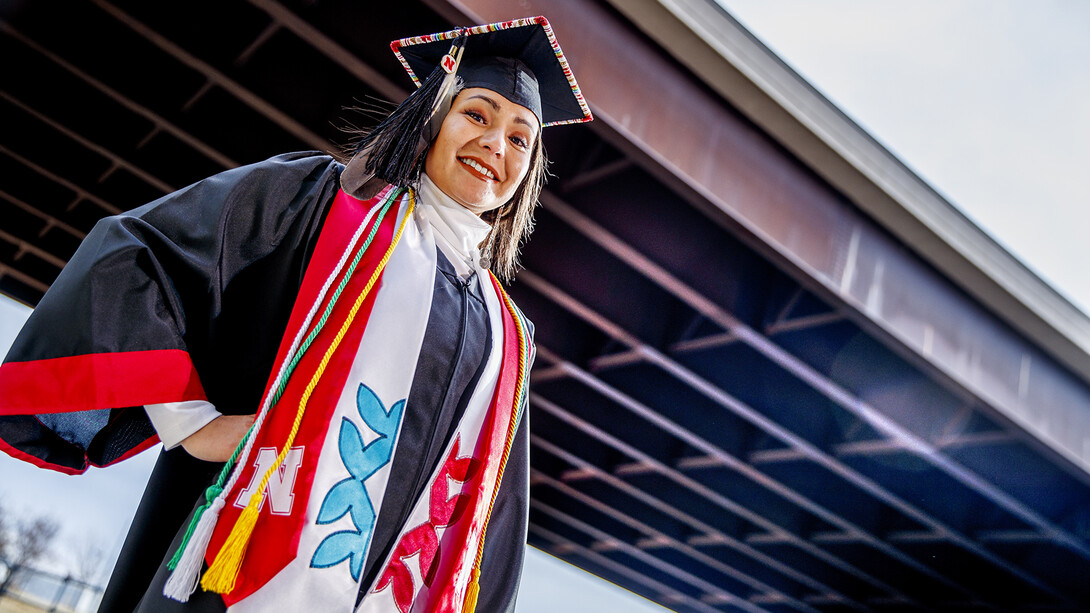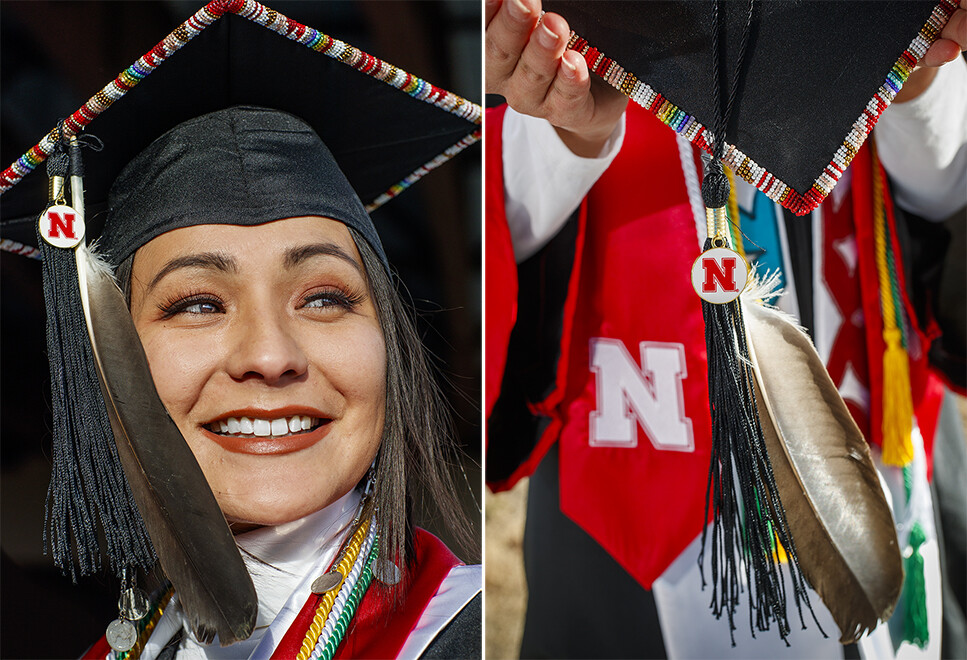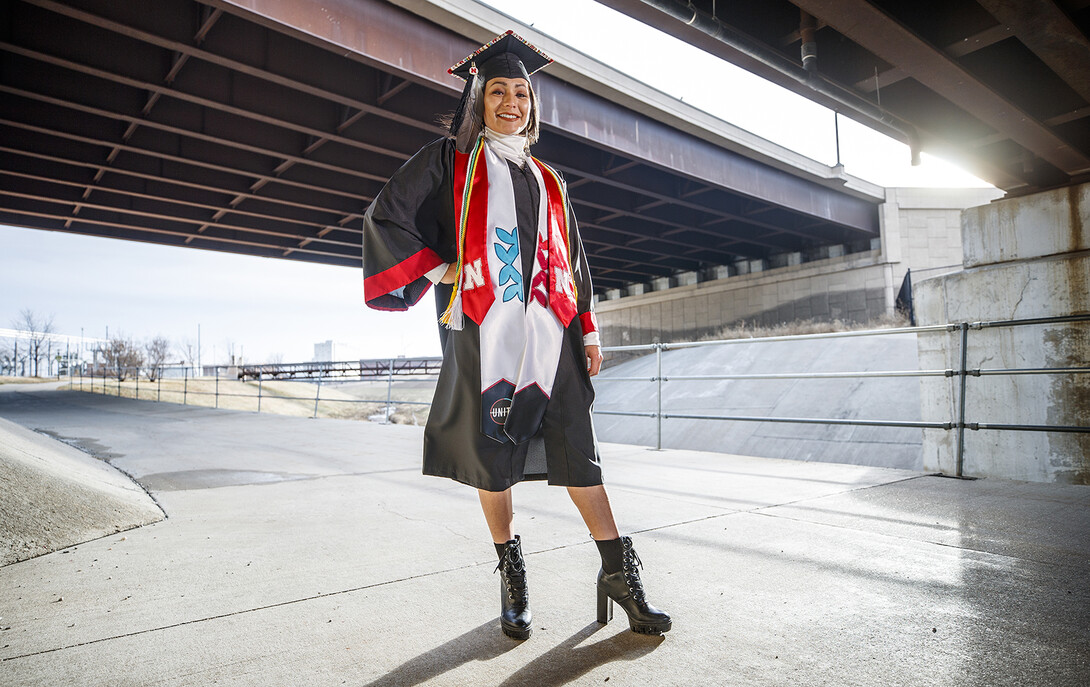
Names — from those given by parents to nicknames earned via adventures with friends — can be weighty things.
For Angelica Solomon, a member of the Winnebago Tribe of Nebraska and a soon-to-be Nebraska Engineering graduate, a sobriquet earned as an infant has served as inspiration, propelling her to step up, taking on challenges and leadership roles that will extend beyond college.
“When I around 3-months-old, I was given the Native American name Ma nè gì waho pì winga, or Great Voice Woman Who Walks This Earth,” Solomon said. “As I was growing up, it made me feel like I really had some big shoes to fill. It felt daunting. But, it led me to the decision to use my voice and advocate for everyone I could — especially fellow Natives.”
A transfer from the University of New Mexico, Solomon tapped into that voice through student involvement at the University of Nebraska–Lincoln. Her primary outlet came from serving as president and treasurer with UNITE, a student-led organization for Native Americans. She also joined Lambda Theta Nu, a Latina sorority; worked as a peer mentor with the Office of Academic Success and Intercultural Services; volunteered to serve as a role model through the YWCA’s SMART Girls program; helped families plan house construction through Bluestone Homes, a subsidiary of Ho-Chunk Inc., an economic development company based in Winnebago; and landed an internship with Olsson, a Lincoln-based engineering firm.

The daughter of two college graduates — including her mother, a Husker alumna who earned a psychology degree — Solomon was pushed to seek higher education. That background helped Solomon buck national statistics that show only 17% of Native American students continue their education after high school, compared to 60% of the entire U.S. population.
When she walks across the stage during Nebraska commencement exercises on Dec. 21, Solomon will be among the 10% of Native Americans who earn a bachelor’s degree.
“This is so important to me because of the statistics,” Solomon said. “While we have the ability to succeed, Natives really don’t go to college. Too many of us don’t have anyone to look up to or someone to push us to earn the degree.
“My hope is to use this degree to give back to my tribe — both as a role model to students and as a professional engineer.”
Her love for the field grew from being challenged by a fifth-grade math teacher and through exposure in high school coursework. It specifically took root following a project in which she used computer-aided design software to design a shed.
“That project was when I learned what civil engineering is, and that I loved it,” Solomon said. “From that point on, I’d walk down the street, imagining that I was taking off layers of each building, exploring how it may have been constructed.”
A challenging final project two years ago in an Intro to Structures course led by Joshua Steelman cemented Solomon’s desire to seek a civil engineering focus in structural analysis. She has continued to build upon that career foundation in the classroom and professionally, earning the Olsson internship and molding it into a full-time, post-graduation job.
As an intern, she worked with a professional civil engineering team on nine government projects revolving around bridge design, improvements and replacements. Her contributions include documenting and quantifying materials needed to build five bridge projects, calculating design details from weld sizes to rebar tension specs, and developing a pedestrian bridge concept drawing.
She will join Olsson as an assistant bridge engineer in the coming weeks. The new post will include some of her duties as an intern while expanding responsibilities, which will include seeing projects through to completion.

Solomon credits her success on campus to the staff of the Office of Academic Success and Intercultural Services; Steelman; Moises Padilla, director of the Nebraska College Preparatory Academy; Amanda Ponce, a former university employee who served as a UNITE adviser and sorority founder; and friends and family.
“I wouldn’t have gotten through college without the relationships I developed on campus, especially those from back in the OASIS lounge space,” Solomon said. “I’d recommend that space to any student who doesn’t have someone to look up to. There are so many amazing people there who challenge you to have tough, but good, conversations.”
Post-graduation, Solomon hopes to continue using her voice, expanding her education by eventually seeking a graduate degree, developing professional contacts and expertise, and increasing her interactions with Native American students while fostering relationships within the Winnebago community.
“Frank LaMere came to talk to UNITE one time — he has since died, but he was always one who spoke with a big voice for the tribe,” Solomon said. “He was famous for saying, ‘Nothing changes unless someone is made to feel uncomfortable. Nothing changes unless we make ourselves uncomfortable.’
“That’s been an inspiration to me through college and will keep driving me in my career. It’s also my motivation for going back home and giving back when I can, helping do a few things that are needed to make some needed changes for my community.”







